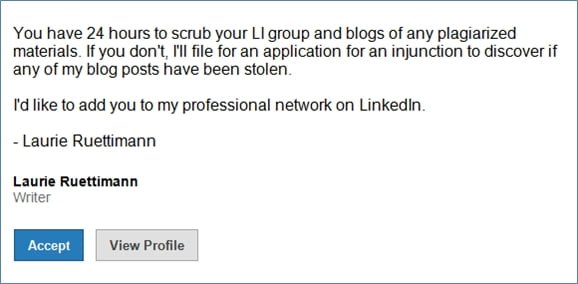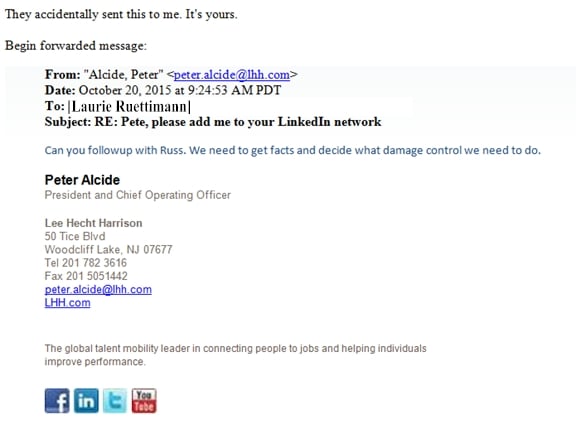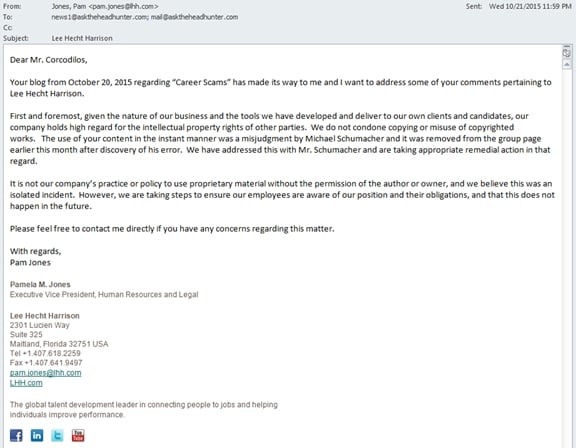In the November 3, 2015 Ask The Headhunter Newsletter, we try to get to the root of why employers routinely abuse job applicants.
Ever wonder where HR departments learn to mistreat and abuse you when you apply for jobs, then disappear behind a veil of impersonal doubletalk and officious sanctimony?
 The answer lies in who they turn to for “best practices” and “HR policies.”
The answer lies in who they turn to for “best practices” and “HR policies.”
An entire HR consulting industry teaches HR departments around the world how to behave, and HR in turn trains you to apply for jobs and tolerate increasing levels of abuse. Curiously, according to Google Finance, most of the top HR consulting firms are privately held. Little is known about how they operate, until now, when an odd copyright violation revealed some of the inner workings of Lee Hecht Harrison (LHH), a unit of Adecco, “the world’s #1 employment services firm.”
What’s copyright got to do with bad HR behavior?
From time to time, I deal with scofflaw publishers who steal copyrighted Ask The Headhunter content. When they realize they’ve been caught, I quickly get a nervous phone call and profuse apologies. Statutory damages for distributing a copyrighted work can be as high as $150,000 per incident, which means if you give copies to just 7 people without permission, it could cost you over a million bucks plus attorney fees. To a content licensing business like Ask The Headhunter, copyright is a serious matter. Nonetheless, my policy is to resolve violations quickly and amicably when possible. Contrite violators make this easy most of the time. A sincere phone call goes a long way.
A few weeks ago, an Ask The Headhunter subscriber tipped me off to a rip-off:

The culprit was Michael Schumacher, an LHH Senior Vice President who posted a slightly modified version of an old ATH article to LHH’s LinkedIn Group for the company’s “clients and alumni.” He could have paid for the article — like LHH’s clients pay for LHH’s materials. Instead, he put his own name on it.
The ATH subscriber concurrently put Schumacher on notice that he’d been exposed.
You’d think Schumacher would immediately pick up the phone and call me to apologize, and to take down the stolen article. Instead, Schumacher hid the ripped-off article behind LinkedIn’s members-only wall and hunkered down.
You can’t hide from social media
“If you are represented in the virtual world, what kind of impression are you making?” cautions a LHH report for job seekers. “In this age of technology, not being in tune with the times could even appear unprofessional and possibly be a mark against you.”
This is where the underpinnings of “global” HR behavior came to light — as one of the world’s leading HR advisory firms revealed what “best practices” in the HR world are all about. Pay attention, because this is the root of the culture that mistreats and abuses you when you apply for a job.
I want you to see how a simple copyright violation revealed how a top HR consulting firm operates. The story features a cast of characters we couldn’t dream up:
- A president whose company’s product is intellectual property — who dispatches “damage control” to cover up IP theft by his company.
- A top HR executive at a corporate outplacement firm that advises clients to have LinkedIn profiles — who has no LinkedIn profile.
- An SVP in charge of “Operational Best Practices” — who steals a competitor’s copyrighted content and passes it off to clients as his own, then hides the evidence after it’s already leaked into the social media.
A social media bust
I love social media. It keeps everyone honest because everything a business does today quickly becomes public. You’d think that a company whose business is teaching “best practices” to HR departments would know that.
After I learned of the rip-off, I waited to hear from Schumacher or someone at his company. They knew that I knew, but no one contacted me. So I published Lee Hecht Harrison rips off Ask The Headhunter, an article that quickly made the rounds of social media. Among the items are tweets from a leading HR writer and critic.
 Laurie Ruettimann even contacted the president of LHH, Peter Alcide, via LinkedIn. Her style is inimitable.
Laurie Ruettimann even contacted the president of LHH, Peter Alcide, via LinkedIn. Her style is inimitable.

You’d think Alcide, manager of a company whose revenues depend on its IP (intellectual property), would realize how big his problem was and immediately call me to apologize and make amends.
The policy and best practice is damage control
Instead, Alcide revealed the company’s duck-and-cover policy that Schumacher was already following. Peter Alcide ordered up “damage control.”

Except LHH’s president sent this order to Ruettimann by mistake, and she forwarded it to me. The bungled e-mail apparently refers to LHH’s Dallas/Fort Worth Area Managing Director, Russell Williams, Schumacher’s boss.
What’s all this got to do with your travails with HR? It’s what Lee Hecht Harrison and a host of HR consultancies teach their clients: how to avoid accountability and personal contact. Alcide wasn’t concerned about damage his company caused — or how to make amends. He was concerned only about covering up his company’s bad behavior. The content rip-off was public, but there would be no public mea culpa.
At this point, you’d think Williams would have immediately contacted me, if only to contain the problem. Instead, he handed it off to HR.
Hiding behind HR
Now I offer a challenge to you, dear readers. After an employer recruits you, wastes your time in hours of interviews, gathers volumes of personal and private information that you must provide under threat of rejection for “being unreasonable” — you’re left hoping for a personal call about the outcome of the hiring process. What happens?
HR sends you an impersonal form letter to blow you off.
I couldn’t make this stuff up. LHH’s next action was to send me the equivalent of the form letter you receive when HR blows you off after mistreating and abusing you.
 (click to view full size)
(click to view full size)
That’s what I received from “Pamela Jones, EVP, Human Resources and Legal” at Lee Hecht Harrison. But don’t bother looking up Pam Jones or Pamela Jones associated with Lee Hecht Harrison or Adecco on LinkedIn. Contrary to LHH’s advice to its clients that a LinkedIn profile is a must in today’s business world, LHH’s top HR executive isn’t on LinkedIn.
Are we starting to see the connection between what this HR consulting company promotes and gets paid for, and how its top executives behave?
- Peter Alcide, the LHH president who ordered damage control so LHH’s clients wouldn’t find out, hid behind damage control.
- Michael Schumacher, the guy who stole my article, hid behind LinkedIn’s firewall.
- Pamela Jones, the corporate lawyer who put on her HR hat, and hid under it.
They all hid behind the same veil that LHH teaches its corporate HR clients to draw between themselves and job applicants. That’s the epic failure of integrity in HR today — “best practices” on display from “the world’s #1 employment services firm.”
And you wonder where HR learns how to mistreat and abuse you while disappearing into a fog of self-serving bureaucracy? LHH’s top HR executive is also its lawyer!
Where do dismissive HR policies come from?
What does a copyright violation have to do with your experiences applying for jobs? Lee Hecht Harrison is a key player in the HR world. According to its Google Finance profile, its parent company Adecco “provides career and leadership consulting through its more than 300 offices covering 60 countries around the globe.”
Employers pay big bucks for LHH’s HR “services in areas such as career and leadership development, outplacement, and executive coaching.”
HR departments and the consulting companies behind them dictate your experience when you’re job hunting. Perhaps worse, this HR hegemony forces you to follow “rules” for getting jobs that contradict your own good business sense and lead you on wild goose chases. But you do it, anyway, because HR people reprimand you — and toss out your application — when you fail to follow those rules.
HR learns this stuff somewhere, from someone. It learns from Peter Alcide, Michael Schumacher, Pamela Jones, and a host of other “policy makers” in the career and employment industry who get paid big bucks for their “guidance” and “best practices.”
Best Practices: A failure of integrity
No decision maker at LHH apologized to me — least of all in Pamela Jones’ letter, which is the only communication LHH has deigned to have with me. No one acknowledged to LHH’s paying clients that they were given stolen advice — or showed them where it actually came from. No one acknowledged that LHH’s content theft caused Ask The Headhunter any harm or damage, much less offered to make amends. It was all “an error” and a “misjudgment” and “an isolated incident” — without any proof that plagiarized content isn’t rife throughout the “intellectual property” LHH sells to its “global” clients for top dollar.
Laurie Ruettimann is right to be worried. Who else’s protected content is being illegally distributed by LHH to its clients? I don’t believe Jones’s assurances for one second.
What’s a copyright violation got to do with how you’re treated when you apply for a job? Both are HR problems.
The treatment you get from HR departments when you apply for a job is considered “best practices” — and it’s exemplified by one of the HR firms that drives HR policy around the world. I’ve just experienced what you go through when an employer hides behind HR.
This story is really about HR’s epic failure of integrity. Integrity can’t be parsed. Either a company demonstrates high standards of behavior in all its dealings — or reveals a lack of integrity across the board.
Ask The Headhunter openly criticizes bad behavior in the career and employment industry, and sometimes specific players including TheLadders, Monster.com, CareerBuilder, and LinkedIn. Job seekers need to be aware of practices that affect their ability to get a job.
Today, a small group of HR consultancies in the career and employment industry establish the standards of behavior that job seekers are expected to meet: How to apply for jobs, how to present themselves, and how to set aside their good business sense if they want to play the HR game of landing a job.
These firms also dictate how HR departments treat and process the people they recruit.
How a top company — that HR looks to for guidance — handled copyright theft reveals problems not only with LHH’s corporate governance and culture, but with its adverse influence over how companies hire and recruit, and how job seekers suffer through the experience.
An industry where nothing is personal
And that’s the problem with the career and employment industry: a lack of personal integrity and a policy of no accountability. It’s why job seekers cringe at the thought of applying for a job; at interviewing with bureaucratic stuffed shirts who cite “policy” and “best practices” as their excuse for disrespectful behavior; and it’s why job seekers don’t dare to expect respectful treatment from hiring managers who take hours of applicants’ time without the courtesy of any follow-up.
- Has a manager ever taken your ideas and your time — perhaps in multiple job interviews — then disappeared behind the corporate veil rather than talk to you?
- Have you ever been subjected to the impersonal swat of the HR hand when a company decides you’re not worth its time?
- Has an HR manager ever demanded your salary history, and when you declined, told you “it’s the policy — we can’t continue without it”?
- Has a company ever revealed a disrespectful culture to you, contrary to the image it projects in its marketing?
What you need to know as a job seeker is, the treatment you get from HR has its roots in HR consulting firms that establish HR practices across companies. What you know now is that LHH’s culture is consistent from the bottom to the top. What you’re left wondering is, what are LHH’s and Adecco’s corporate clients paying for when they hire these firms and buy their content?
This is a company stuck in the dark ages of corporate HR hegemony, that telegraphs a message that personal responsibility can and should be hidden behind “damage control” — in an age when everything is public.
How can any employer that competes in today’s world adopt “best practices” from an HR consultancy whose own practices suck so badly?
In today’s business world, it’s not always about whether you can make a buck; it’s about the face you show to the public, to your customers, to your competitors, and to people who bust you when you rip them off. But Lee Hecht Harrison clearly doesn’t operate in today’s world. Since few HR departments do, either, is it any wonder that earnest job seekers can’t catch a break in an HR world where integrity is a big FAIL?
In this copyright incident, Lee Hecht Harrison has done nothing to make amends for its violation. Its HR executive has merely avoided acknowledging that the company did any damage.
Why make a big deal of this?
Because job seekers aren’t in a position to — and because LHH’s behavior with respect to a copyright violation reveals a stunning failure of corporate ethics and integrity in the career and employment industry. It’s a big deal because rude, impersonal practices in HR make it hard for employers to hire — and harder for job seekers to get jobs.
Mistreating and abusing you when you apply for jobs is nothing personal — these people don’t know what personal means. It’s simply best practices. But we all deserve better.
Integrity. It’s been defined as what you do even when no one is watching. But what if you get busted? How do you acknowledge and make amends? Have you encountered abusive, impersonal behavior when dealing with employers? Where do you think it comes from? How should we all deal with it? If you work in HR, I’d especially like to hear from you — tell us how your company demonstrates integrity.
Update: November 24, 2015
Following the publication of this article Peter Alcide, President and COO of Lee Hecht Harrison, called me and did the right thing. In a tweet and a posting on the LHH website, he issued a public apology for violating Ask The Headhunter copyright, made restitution for misuse of the content, and the matter is resolved.
: :
I have no problem doing this via work e-mail, but to be forced to join a social media group — where what we post can be mined, according to one of my clients — is tantamount to agreeing to LinkedIn’s terms and conditions, none of which I have been able to see.









